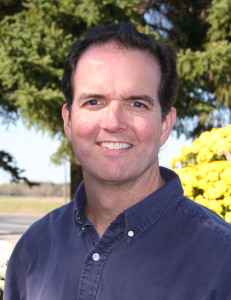by Kathy Keary, Co-director of Precious Blood Companions
 St. Mary Church in Centerville, Iowa was the site of Jim Ennis’ presentation, Ecology: What’s Faith Got to Do with It?, part of the Peace and Justice Lecture Series. Jim Ennis is the executive director of Catholic Rural Life, a non-profit whose mission is to renew faith by bringing the Gospel of Jesus Christ and the social teaching of his church into the heart of everyday life. Their areas of focus are threefold: ethical food and agriculture, environmental stewardship, and the focus of the April 11th talk, care of creation.
St. Mary Church in Centerville, Iowa was the site of Jim Ennis’ presentation, Ecology: What’s Faith Got to Do with It?, part of the Peace and Justice Lecture Series. Jim Ennis is the executive director of Catholic Rural Life, a non-profit whose mission is to renew faith by bringing the Gospel of Jesus Christ and the social teaching of his church into the heart of everyday life. Their areas of focus are threefold: ethical food and agriculture, environmental stewardship, and the focus of the April 11th talk, care of creation.
Social justice is commonly known among its advocates as the church’s best-kept secret. Of the seven themes of Catholic Social Teaching, the people in the pews are probably least aware of care for God’s creation as an essential part of the Catholic faith. It is not unusual for an individual to compartmentalize, maintaining different values in various aspects of one’s work life, church life, and personal life. As Catholics, we are called to allow our faith to direct all aspects of our life. Care of the environment is frequently considered an option rather than a mandate of being a follower of Christ. Mr. Ennis asserts that this compartmentalization is one of the reasons we have an ecological crisis.
Sophistication in agriculture has resulted in a huge reduction in the number of farmers. Those continuing to farm are utilizing huge machines separating them from the soil. Only 17% of United States residents live in rural areas, with only 2% engaged in farming. Young people are leaving rural life. Disconnect between people and the earth is cited as a contributing factor promoting a lack of concern for the God’s creation.
The Book of Genesis tells us that when God created the universe, He looked at all that He had made and found it to be very good. God gave us dominion over the work of His hands. The mentality that we can use the earth in any way we choose is contrary to the idea of gift. It is our responsibility to steward creation. Mr. Ennis encouraged us to view the world as gift rather than just the political issue of the environment. He believes this mindset will heighten our perception of our responsibility: a common and universal duty to serve the common good as we care for this awesome gift.
Much of the day was spent detailing the Church’s position in caring for creation. Many are looking forward to Pope Francis’ insight on this topic in an upcoming document. St. John Paul II warned in his 1990 message for the World Day of Peace: “Modern society will find no solution to the ecological problem unless it takes a serious look at its life-style. In many parts of the world, society is given to instant gratification and consumerism while remaining indifferent to the damage which they cause…Simplicity, moderation, and discipline, as well as a spirit of sacrifice, must become part of everyday life, lest all suffer the negative consequences of the careless habits of a few.”
The Compendium of the Social Doctrine of the Church also emphasizes the care of creation as a part of our duty as Catholics. The issue of exercising unconditional dominion over the created world, regardless of moral considerations was raised as a problem.
Pope Benedict XVI’s encyclical letter, Caritas in Vertitate (Charity in Truth) included the topic of care for the environment. The section begins: “Today the subject of development is also closely related to the duties arising from our relationship to the natural environment. The environment is God’s gift to everyone, and in our use of it we have a responsibility towards the poor, towards future generations and towards humanity.”
Jim Ennis emphasized that our politicians have a responsibility to us and it is our right and duty to communicate our concerns to them. At the same time, he does not think we will get to where we need to be regarding environmental issues by regulation alone. He said: “I think we will get there by transformation. We need to do what we can within the Body of Christ to act responsibly. This is a shared concern.” He insisted that we must think about the broader community in our decision-making and actions. As people of faith, we are called to look at what we are putting on our lawns and fields, which ends up in our water system. Our faith leads us to recycle, reuse, and reduce waste. We are reminded of Mother Theresa’s invitation, “Do what is in front of you.”
